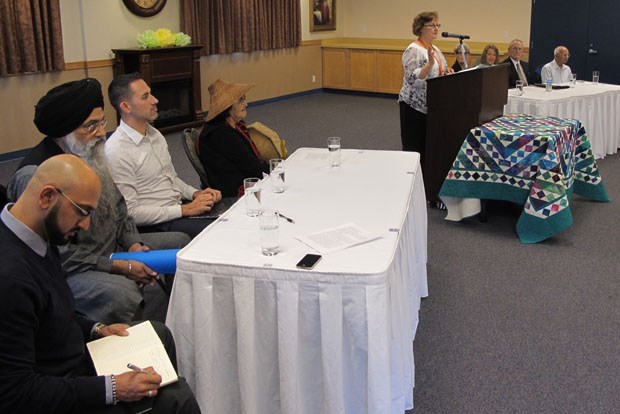The need for spiritual and religious care is necessary for the wellbeing of one’s life and spirit even more so when you are in a supplied care facility.
This was a common idea shared by a panel of religious leaders with the staff and residents of Delta View as they marked Spiritual & Religious Care Awareness Week and the theme of the Right to Believe last week.
“This national multi-faith week is meant to recognize those who provide spiritual and religious care across Canada in facilities such as prisons, nursing homes, hospice and hospitals,” said Delta View’s spiritual care director Laurie Deakin. “I wanted to put on an event where we could invite faith leaders from our community to provide some insight into why providing spiritual and religious care is so important. From my perspective, the more we understand about each other, the more peace there will be and the less fear there will be in the world.”
After brief introductions and a traditional blessing and welcome song from Tsawwassen First Nation elder Ruth Adams, each presenter gave a five- to 10-minute presentation of their faith and their position on why spiritual care was important.
Presenters included Ladner’s Carol McKee, representing the Ba’hai faith; pastor Lee Kosa from Cedar Park Church in Ladner representing the Christian faith; Jamil Popatia representing Islam; Dr. Jagessar Das from the Kabir Association of Canada; elder Brad Crane and sister Susan Crane from the Church of Jesus Christ of Latter-day Saints and the Mormon faith; and Harminderpal Singh representing the Sikh community.
McKee said the topic of spiritual and religious care is one completely in line with the Ba’hai faith.
“It is especially gratifying that your institution is attempting to overcome the challenges in providing an open forum and dialogue on spiritual care,” she said. “In regards to the residents of this care facility, if a person describes themselves as spiritual rather than religious, chances are they have developed their own unique way to understand their existence. The caregivers themselves will also have their own spiritual and religious beliefs. This diversity will likely pose a challenge to spiritual care, so having an open, respectful mind and heart is essential.”
Popatia said in the aspect of providing care for those living outside of the traditional family home, really it is not all that different than providing care for other fellow human beings.
“There is no compartmentalization of how to offer compassion,” he said. “When you look at all of us — human beings in general — one thing we share in common despite being from different racial and ethnic stocks is we share our vulnerability with all of us.”
Das emphasized that spiritual care is essential in any care facility setting no matter the religious faith.
“We must treat each other as equals no matter what religious beliefs we may have. If we can accomplish this, scientific studies have shown that the residents in these care facilities do get better faster, have a better outlook on life, so care is necessary,” he said.
Following the discussion, residents were invited to speak with the guests one-on-one and ask questions while they enjoyed light refreshments.
“Certainly I think this added to everyone’s sense of acceptance and better care for people who are coming from different faiths and backgrounds. I think individually as well as a community this was is an important event to have,” Deakin said.



